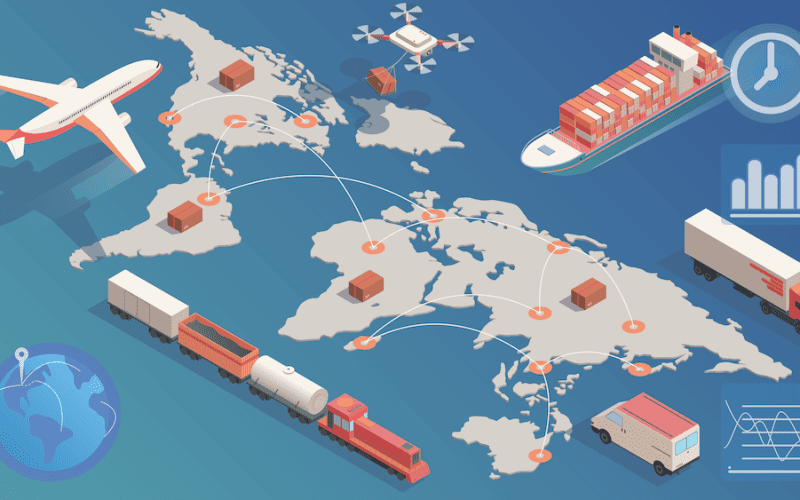International trade relations have long been the cornerstone of global economic development, influencing everything from national economies to international diplomacy. As we look towards the future, several key trends and challenges are poised to reshape the landscape of global trade. This article explores the evolving dynamics of international trade, examining emerging trends, potential challenges, and the implications for various stakeholders
Digital Transformation and E-Commerce

The digital revolution has dramatically transformed international trade. E-commerce platforms enable businesses of all sizes to reach global markets, breaking down traditional barriers to entry. The rise of digital payment systems, blockchain technology, and advanced logistics solutions has streamlined cross-border transactions, reducing costs and improving efficiency. The proliferation of data analytics and artificial intelligence (AI) also offers new opportunities for optimizing supply chains and predicting market trends.
Table 1: Impact of Digital Transformation on Trade
| Aspect | Impact | Examples |
| Market Reach | Expanded access to global markets | Amazon, Alibaba |
| Transaction Speed | Faster and more efficient | Blockchain for trade finance |
| Cost Reduction | Lower operational costs | Digital payment systems |
| Supply Chain Optimization | Improved efficiency | AI-driven inventory management |
Geopolitical Shifts and Trade Policies
Geopolitical changes and shifting trade policies are also shaping the future of international trade. The rise of protectionism, trade wars, and regional trade agreements are altering global trade patterns. Countries are increasingly focusing on strategic trade partnerships, with agreements like the Regional Comprehensive Economic Partnership (RCEP) and the United States-Mexico-Canada Agreement (USMCA) reflecting this trend. Additionally, the ongoing trade tensions between major economies such as the U.S. and China continue to influence global supply chains and trade flows.
Table 2: Major Trade Agreements and Their Impact
| Agreement | Member Countries | Key Features | Impact |
| RCEP | 15 Asia-Pacific nations | Tariff reductions, trade facilitation | Strengthens regional trade in Asia-Pacific |
| USMCA | U.S., Canada, Mexico | Modernized trade rules, labor standards | Enhances trade relations in North America |
| CPTPP | 11 Pacific Rim countries | Market access, economic integration | Promotes free trade across the Pacific Rim |
Trade Wars and Protectionism
Trade wars and protectionist policies pose significant challenges to international trade. Tariffs and trade barriers can disrupt global supply chains, increase costs for businesses, and lead to retaliatory measures from other countries. The recent trade disputes between the U.S. and China exemplify how such conflicts can create uncertainty in global markets and impact international trade dynamics.
Analysis Table: Impact of Trade Wars
| Factor | Effect of Trade Wars | Example |
| Supply Chain Disruption | Interruptions and increased costs | U.S.-China trade war affecting electronics |
| Increased Costs | Higher tariffs and operational expenses | Rising prices for consumer goods |
| Market Uncertainty | Volatile trade relations | Fluctuations in global commodity prices |
Environmental and Social Responsibility

There is growing emphasis on environmental and social responsibility in international trade. Consumers and governments are increasingly prioritizing sustainability and ethical practices. This shift is driving businesses to adopt greener practices and ensure fair labor standards throughout their supply chains. Compliance with environmental regulations and social responsibility standards is becoming essential for accessing global markets.
Comparative Table: Sustainability Standards
| Standard | Focus Area | Requirements | Impact |
| Paris Agreement | Climate change | Reduction in greenhouse gas emissions | Encourages low-carbon trade practices |
| Fair Trade Certification | Social responsibility | Fair wages, ethical sourcing | Enhances consumer trust and market access |
| Global Reporting Initiative | Corporate transparency | Environmental and social impact reporting | Increases accountability and sustainability |
Businesses
Businesses must navigate the complexities of international trade by staying informed about regulatory changes, trade agreements, and emerging technologies. Companies that leverage digital tools and adopt sustainable practices are likely to gain a competitive advantage. Additionally, businesses must be prepared to adapt to shifting geopolitical landscapes and economic conditions.
Governments
Governments play a crucial role in shaping international trade policies and agreements. They must balance the interests of domestic industries with the benefits of global trade. Strategic trade policies, investment in infrastructure, and fostering international partnerships are essential for maintaining a competitive edge in the global market.
Consumers
Consumers are becoming more influential in shaping international trade through their preferences for sustainable and ethically produced goods. Increased awareness of environmental and social issues is driving demand for responsible trade practices. Consumers’ choices will continue to impact how businesses operate and how trade policies evolve.
Table 3: Comparative Overview of Trade Trends
| Trend | Impact on Trade Relations | Example |
| Digital Transformation | Expanded market access, efficiency | E-commerce platforms and AI in logistics |
| Geopolitical Shifts | Altered trade patterns, new agreements | USMCA, RCEP |
| Trade Wars | Disruption, increased costs | U.S.-China trade war |
| Environmental and Social Responsibility | Increased standards, consumer influence | Fair Trade Certification, Paris Agreement |
The future of international trade relations will be shaped by how effectively businesses, governments, and consumers adapt to these evolving trends and challenges. By staying informed and proactive, stakeholders can better navigate the complexities and seize opportunities in the global marketplace.
Technological Innovations and Trade Efficiency
Technological innovations are set to redefine the efficiency and scope of international trade. Technologies such as 5G, the Internet of Things (IoT), and robotics are enhancing supply chain management and logistics. 5G networks promise faster communication and real-time data exchange, crucial for coordinating complex global supply chains. IoT devices enable better tracking of goods, ensuring transparency and reducing losses. Robotics and automation streamline production processes, reduce costs, and improve the accuracy of inventory management. As these technologies become more integrated into international trade systems, they will drive further efficiency and innovation, allowing businesses to respond more swiftly to market demands and disruptions.
The Role of Multilateral Institutions
Multilateral institutions such as the World Trade Organization (WTO) and the International Monetary Fund (IMF) play a pivotal role in shaping international trade policies and resolving disputes. The WTO provides a framework for negotiating trade agreements and settling trade disputes between countries, aiming to ensure fair competition and reduce trade barriers.
The IMF supports global economic stability by providing financial assistance and policy advice. As global trade becomes more complex, these institutions will need to adapt to new challenges, including digital trade, trade wars, and environmental concerns. Strengthening their role and updating their frameworks to address emerging issues will be crucial for maintaining a stable and equitable global trading system.
Conclusion
The future of international trade relations is characterized by rapid technological advancements, shifting geopolitical dynamics, and increasing emphasis on sustainability and social responsibility. As these trends continue to evolve, stakeholders must stay agile and informed to navigate the complexities of the global trade landscape. Embracing digital transformation, adapting to changing trade policies, and prioritizing ethical practices will be key to thriving in the future of international trade.












